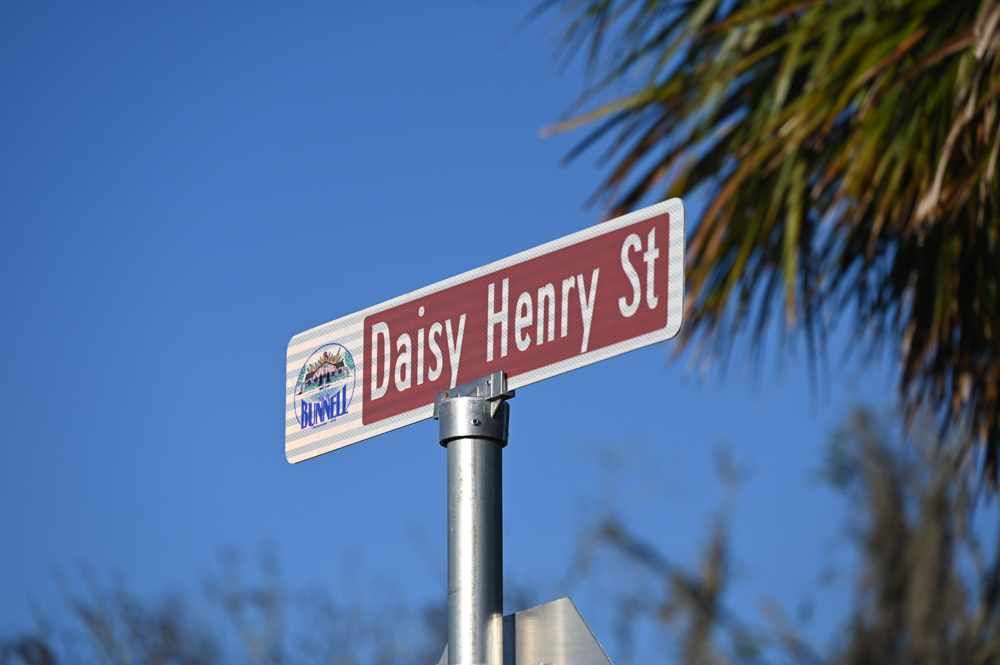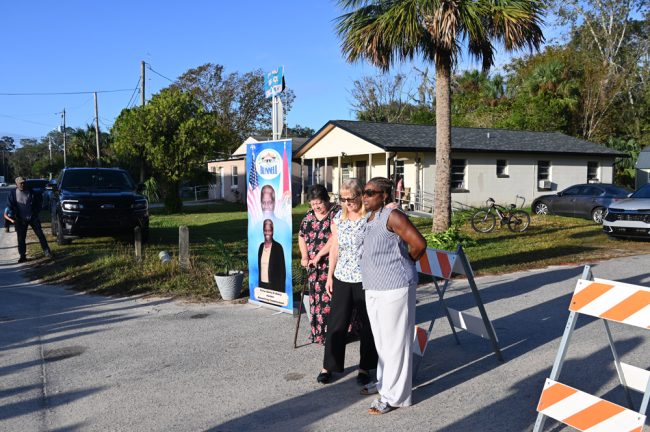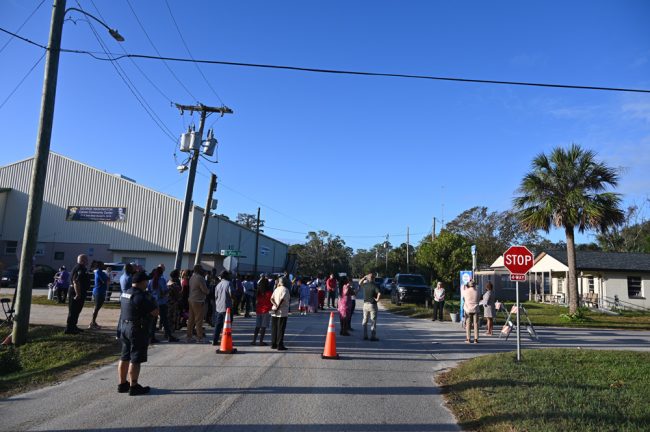
Carver Gym stands, hulking with history and the wear of many battles for its survival, near the southwest end of East Drain Street, at South Church. The house Daisy Henry–the late Daisy McKay Henry–owned is at the other, northeast end of East Drain. This morning, that stretch of four blocks, along the gym’s ballfields on one side and family homes on the other, became Daisy Henry Street, so renamed by a city that wanted to “honor a legacy,” in the words of City Manager Alvin Jackson, and bolden Henry’s already distinguished mark on Bunnell’s history.
Some 90 people had gathered in the morning shadows of the Carver Center for the unveiling of the white and brown commemorative street sign, making Henry, who had been a city commissioner on and off from 1999 to 2013, the third relative contemporary in Bunnell to have a street in his or her name. Dr. Morris Carter, the former head of the Flagler Health Department who died last month, has Dr. Carter Boulevard named for him, and Dr. John Canakaris has Canakaris Street named for him. But only Henry had lived, breathed and fought on East Drain.
“You know she was a warrior. You know. If you didn’t know that, you had never met Daisy,” Mayor Catherine Robinson, who served alongside Henry the entirety of Henry’s years on the city commission, said. “She had no trouble telling you what things were good, about what things weren’t good, and she didn’t mince words. So you didn’t miss the message. She would call me on my cell phone and say, I’m not happy about this and that, then she’d text me and say, I need you to call me.”
Henry was a pastor first, Robinson said, with “a heart for God and a heart for children and a heart for the community,” developing summer programs for children and always fighting for the survival of Carver Gym as if East Drain Street were her barricade. She’d gone to school there when it was George Washington Carver school, she was raised in the South Bunnell community and lived there all her life. “So this is her home, and she stayed here to be that advocate for people coming behind it,” Robinson said.
Robinson told the story of when she and her husband visited the Ford Museum in Dearborne, Michigan. It included a display honoring George Washington Carver. Robinson sent pictures to Henry, whose immediate reply was: “That’s why we got to preserve the gym.”

“So what a wonderful opportunity to give her glory and praise for the work that she’s done,” Robinson said.
The street signs cost the city roughly $600. They will not replace the official name of the street, so residents’ official addresses, like that of the Carver Center, will not change. The Carver Center since its last battle for survival in 2010–a battle Henry led–has been jointly funded by the county, the school district, Bunnell and the Sheriff’s Office. Two school board members, two county commissioners and two Bunnell city commissioners (just two?), the mayor included, turned up for this morning’s ceremony under a rising sun and next to the shimmers of the Carver Center’s bedewed fields.
“This is just incredible to basically name this street after her,” Jackson, who had another reason to boast about “the best little city in the country,” said. “It’s just a representation of the work that she’s done in this community. And I know personally, when I first came here, she introduced herself to me as I was interviewing, and we had some hiccups, but she told me, just be encouraged, let God work it out.” The commission hired him in September 2018. “She was one that was always loving, always stopped me on the road, and always had words of wisdom.”
City Commissioner Tina-Marie Schultz, Henry’s daughter Angela Williams (Henry had six children, one of whom died in 2019) and her sister Barbara Williams also spoke. “If I had to sum her up in a sentence, the old adage, she spoke softly, but she carried a big stick,” Schultz said, a kindness to Henry, who did not always speak softly, especially when she had a lesson to teach any of the local government boards.
Barbara Williams weaved her tribute to her sister into the cadences of the pulpit Henry cherished so much, and the familiar rhetoric of Martin Luther King, whose name she invoked so often. “She left no stones unturned at times of triumphs or trouble. She carried that torch with grace and humility, as I would paraphrase from the words of Dr Martin Luther King, Daisy fought the good fight,” Williams said, her voice soaring: “She wanted to do God’s will. She has been to the mountain top. She’s seen the promised land. Daisy’s happy right now. She’s not worried about anything. She’s not fearing any man. Her eyes, hallelujah, have seen the glory of the coming of the Lord. Daisy Henry’s service is complete. She is free at last. She’s free at last. Thank God almighty. She’s free at last.”
It is time for someone else, Williams challenged, to pick up where Henry left off.
![]()






























Atwp says
Wow what a story!